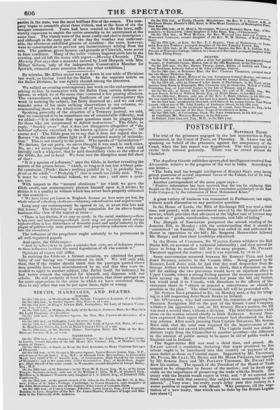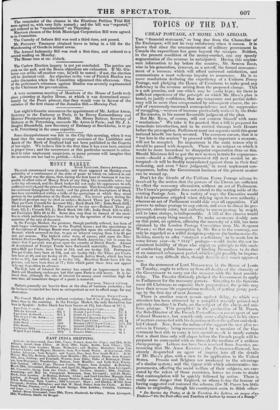In the House of Lords, the Bills of Exchange Bill
was read a third time, and passed ; with an amendment moved by the Marquis of LASS- DOWER, which provides that advances at the higher rate of interest may be made on "goods, merchandise, warrants, and bills of lading."
The Marquis of NORMANBY postponed the second reading of the Jamaica Bill, to Monday ; with the understanding that it should be "eoncmittecl" on Tuesday. Mr. Burge was called in, and addressed the House in opposition to the ; Mr. Sergeant Merewether followed Mr. Burge ; and then their Lordships adjourned.
In the House of Commons, Sir WALTER JANES withdrew the Hull Docks Bill, on account of a technical informality ; and then moved for leave to bring in another bill for the same purpose. Mr. POULEIT THOMSON opposed the motion ; and it was rejected, by ';0 to 57.
Some conversation occurred between Sir ROBERT PEEL and Lord JOHN RUSSELL relative to the Canada Bills. Being pressed by Sir Romer, Lord Jonx said, he had that day read despatches from Sir George Arthur which induced him to think, that a discussion on the bill for uniting the two provinces would have an injurious effect in Upper Canada, where a strong feeling against the measure appeared to have sprung up. He therefore would not press the bill any further, but would send it to Canada, with directions to the officers of Go- vernment there to " obtain as general a concurrence as should be possible in the plan." The other Canada bill will be proceeded with. Mr. SPRING RICE promised to fix, on Monday next, a day for bring- ing in a bill respecting Joint Stock Banks in Ireland. Mr. O'CONNELL, who had announced his intention of opposing the Shannon Navigation Bill on the part of the Grand Canal Company, withdrew his opposition ; and, on Mr. SPRING Rules motion, the bill was read a second tune, without a division. The brief discussion which arose on the motion related chiefly to Irish Railways. Several Mont- bars expressed their regret that Government had abandoned the Rail. way scheme. After much pressing from Captain BOLDER°, Mr. SPRING RICE said, that the total sum required for the improvement of the Shannon would not exceed 250,000/. The Captain could not obtain a distinct reply from the Chancellor to another question—the differe»ce in the amount of public money to be spent in aid of public works in England and in Ireland. The Sugar-duties Bill was read a third time, and passed. Mr. EWART moved a resolution, declaring that sugar produced by free labour ought to be introduced into this country on payment of the same duties as those on Colonial sugar. Supported by Mr. THOHNELY, Mr. PEASE, Mr. CLAY, MT. HUME, and Mr. MARK PHILLIPS, but opposed by Mr. SPRING RICE and Mr. POULETT THOMSON, Mr. EWART
with-
drew his motion. The speech of the President of the Board of '1 ratio seemed to be altogether in favour of the motion ; and he dwelt espe- cially on the importance of preserving the trade with the Brazils. he treaty with the Brazils would expire in 1842, and "if we entered into fresh relations with that country, this subject must necessarily be con- sidered." rVery true ; but every year's delay puts this country in a worse position to negotiate with Brazil. Why postpone, till the nego- tiation of a new treaty, that which can be done by the British Legisla- ture alone ?] The remainder of the clauses in the Elections Petition Trial Bill were agreed to, with very little remark ; and the bill was "reported," and ordered to be "recommitted" on Thursday.
Nineteen clauses of the Irish Municipal Corporation Bill were agreed to in Committee. The Custody of Infants Bill was read a third time, and passed.
Mr. PotmErr Tflomsost obtained leave to bring in a bill for the 'Warehousing of Goods in inland towns. The Annual Indemnity Bill was read a first time, and ordered to a second reading on Monday. The House rose at one o'clock.



























 Previous page
Previous page